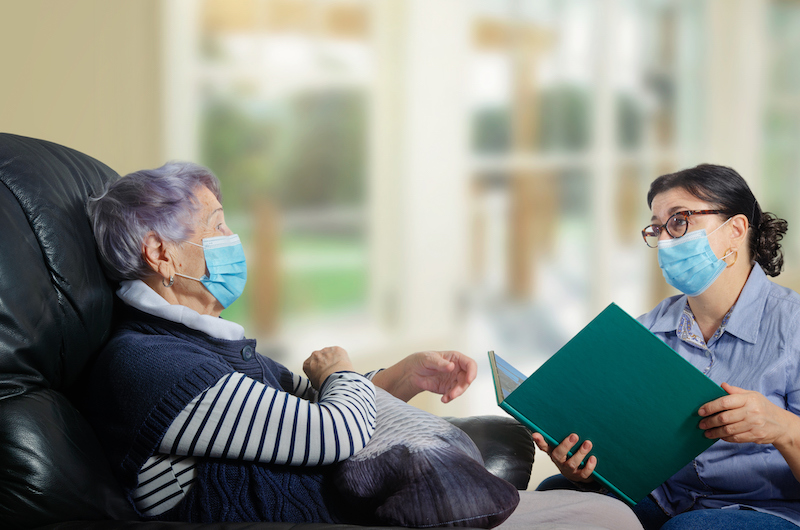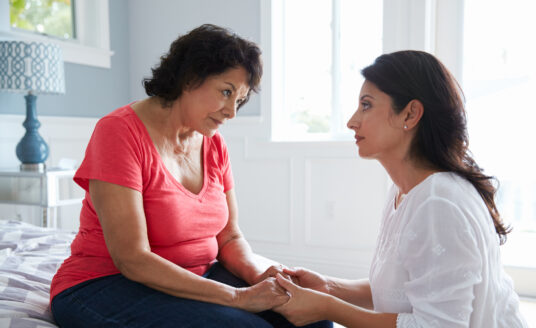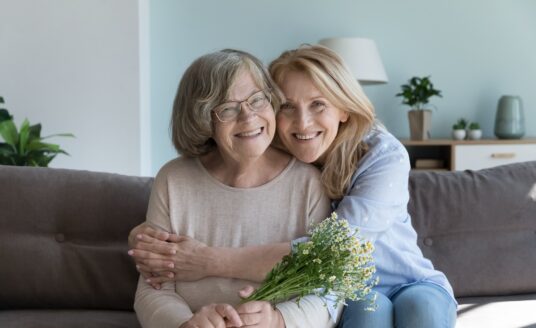Since early 2020, people have been dealing with the uncertainty surrounding COVID-19. Millions wondered (and still wonder) if they had contracted it. They may have experienced some of its symptoms. They waited and worried, isolated themselves from family and friends, and may have eventually sought out testing.
If you are the spouse, family member or family caregiver of a senior adult living with dementia, you must watch for signs of COVID-19 in your loved one, who is in an extremely vulnerable position physically and cognitively.
“People with dementia are battling many things at once,” says Michele Kimball, Bethesda Corporate Director of Clinical Services. “They sometimes can’t tell you when they are hungry, thirsty, or even when they are in pain.”
Know the Symptoms of COVID-19
If you are caring for a senior with dementia, you need to know the symptoms of COVID-19:
- Fever or chills
- Cough
- Shortness of breath or difficulty breathing
- Fatigue
- Muscle or body aches
- Headache
- New loss of taste or smell
- Sore throat
- Congestion or runny nose
- Nausea or vomiting
- Diarrhea
Watch for Non-Verbal Signs
According to Michele, you will also need to recognize how your loved one expresses these symptoms.
“It’s easy to miss the little things that people with dementia do,” she says. “Look for something they’ve just recently started doing, like coughing. Have they suddenly developed diarrhea? Have you noticed they aren’t moving around like they normally do? Are they grimacing? Are they more withdrawn than usual? These could be signs of illness.”
Watch for Behaviors that Put Them at Risk
The inability of senior loved one living with dementia to understand the reason for wearing a mask, handwashing, and observing social distancing makes them more susceptible. Michele advises not forcing them to wear a mask but become more observant of their actions and assist in helping them practice good hand hygiene after using the restroom and at mealtime.
In addition, minimize the senior’s exposure to people and have visitors practice social distancing while keeping in-person visits with others to an absolute minimum.
“Keep in mind that dementia already makes them feel ‘boxed in’ and confused about their surroundings,” Michele says. “Faces that were once familiar can become strangers while wearing a mask.”
People living with dementia are comforted by the familiar, and therefore it is important to keep the daily routine as consistent and predictable as possible. If a resident at Bethesda has to be moved to a different room due to illness, Michele says, the staff attempts to simulate their original room to provide familiarity, including moving items such as photos, pictures, and lamps into the room with them. “Even though the staff is masked and wearing face shields/eye protection, perhaps the resident will hear a familiar voice coming from underneath the mask,” Michele says.
Michele also notes that the behaviors of someone living with dementia may cause you to miss the physical symptoms of COVID-19, and she advises erring on the side of caution: “If you as a caregiver think or sense that your senior may have contracted the virus, get them tested,” she says.
Recovery is Possible
People with dementia do survive COVID-19. Michele notes that if they require hospitalization, it will take a long time to recover; and they may not ever completely recover. “It’s an uphill battle. Prevention and early detection are key” she says.
Caring for a loved one living with dementia is always difficult, but even more so during a pandemic. Visit our blog for more helpful tips for caring for loved ones with memory loss.



